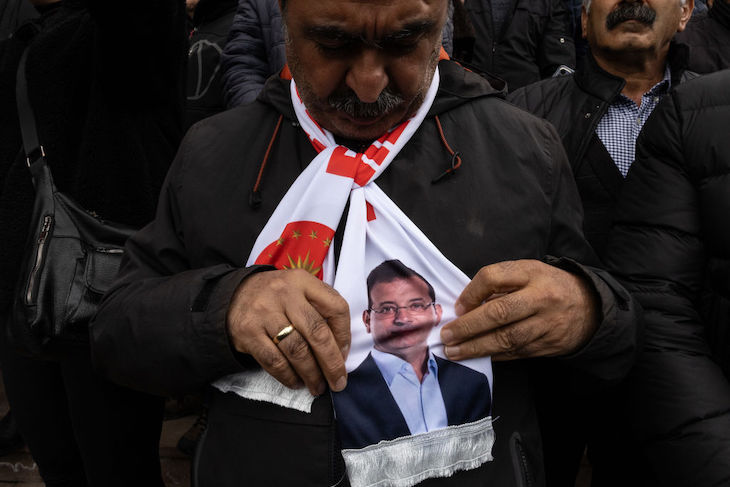Ekrem Imamoglu, Turkish president Erdogan’s main rival and the mayor of Istanbul, was arrested in the early hours on Wednesday. The warrant was issued on allegations of fraud, corruption, and aiding a terrorist group.
Imamoglu recently announced his intentions to run against Erdogan, even though no election is scheduled for another three years. Most opinion polls show Imamoglu as the most popular politician in the country. He is generally regarded as the man with the highest chance of defeating Erdogan in the elections.
His arrest comes as a major blow to his People’s Republican Party (CHP) and the opposition at large. In recent months, government pressure on opposition groups surged, with several politicians, activists, and journalists put on trial or arrested. Yet arresting the most popular opposition leader from a mainstream party – established by the founding father of the nation, Ataturk – was a red line many thought the government would never dare to cross, until Wednesday morning.
Over a hundred people were arrested alongside Imamoglu in a large-scale police operation. Twenty police cars were sent to pick up the mayor from his home. Imamoglu posted a video of himself putting on a tie and preparing to go out and meet the police saying: ‘We are facing immense oppression, but we will not be deterred. I place my trust in the will of our people. Let it be known to everyone that I will stand firm and resolute. I will continue to fight against those who exploit this process for their own agenda.’
The charges against Imamoglu include ‘aiding a terrorist organisation’, the Kurdistan Workers’ Party (PKK) – a claim he vehemently rejects. He has also been facing several other trials on various allegations. Just the day before, Istanbul University cancelled his diploma citing some minor irregularities. The move is significant as, according to Turkish law, a university degree is required to be candidate for the presidency.
The arrest was widely condemned at home and abroad. The leader of CHP, Ozgur Ozel, said the country has returned to the post-coup military junta governance of 1980s Turkey. Several other opposition party leaders also used the term ‘civil coup’ to describe the arrest.
‘They are going at full speed to become a fully authoritarian state,’ said the European Parliament’s Turkey rapporteur Nacho Sanchez Amor.
In Istanbul, thousands of supporters and students flocked to the streets to protest the arrest, despite the governor banning all demonstrations and gatherings for four days.
Thousands of riot police officers were also deployed and main squares blocked to traffic with metal barricades. At several points, the police unsuccessfully attempted to break up the crowd using batons and tear gas.
’The protest was crowded, perhaps 10,000 people turned up,’ said Abdul, a student who joined the demonstration. ‘But it wasn’t 100,000, as it should have been. Some there were annoyed with the CHP leadership who were diverting the anger and saying let’s come out again on Sunday.’
On Sunday, the CHP is holding its presidential candidate selection. It was always going to be mostly a symbolic move as Imamoglu is the only one running in the primary and the presidential elections are scheduled only for 2028. According to the constitution, Erdogan cannot run for a third term. But he can circumvent this, either by calling a snap election before 2028, or changing the constitution.
The value of the Turkish lira was quick to take a nosedive following the arrest. Now it is trading at around 50 against the British pound – just two years ago, it was at 23. This will further exacerbate the inflation crisis the Turkish economy has been engulfed in since 2018.
Imamgolu’s arrest could easily backfire for the government. It is difficult not to draw parallels with Erdogan himself, who was once arrested and imprisoned on trumped-up charges in the late 1990s. His crime was reciting a poem while he held the same position as Imamoglu, the mayor of Istanbul. The incident made him more popular than ever.
In 2019, when Imamoglu first won the mayorship of Istanbul by a small margin of 13,000 votes – Istanbul has a population of 16 million – the government cancelled the results. In the rerun a couple of months later, Imamoglu won again but by a margin of 800,000 votes. The electorate in Turkey often side with the underdog.







Comments